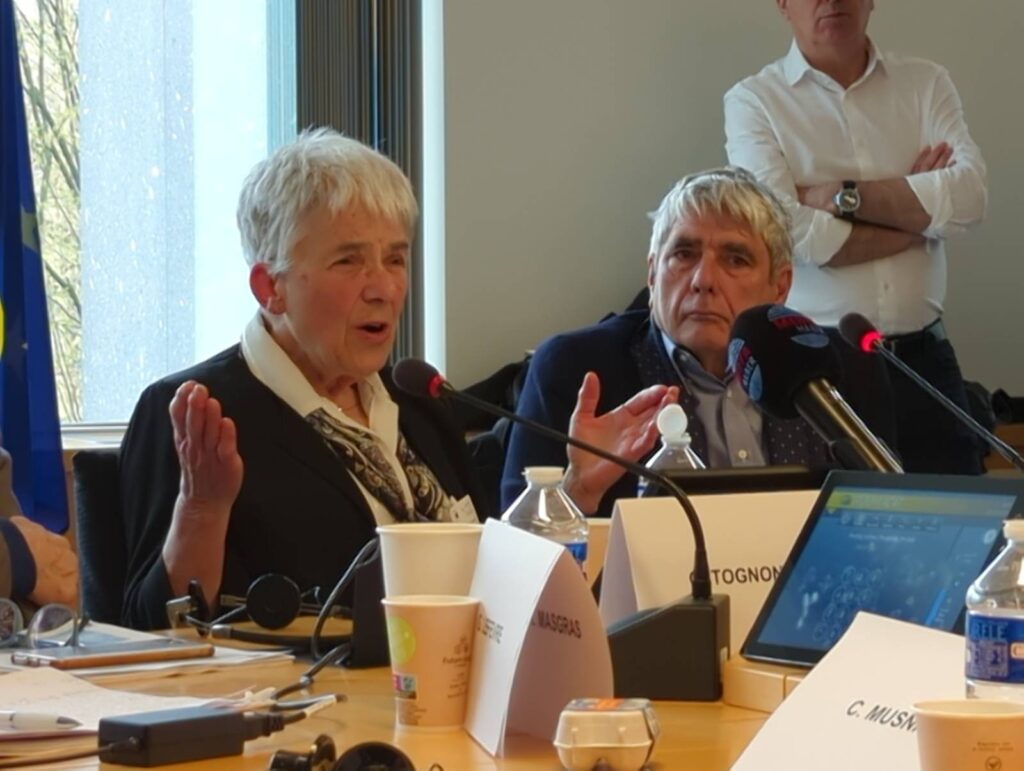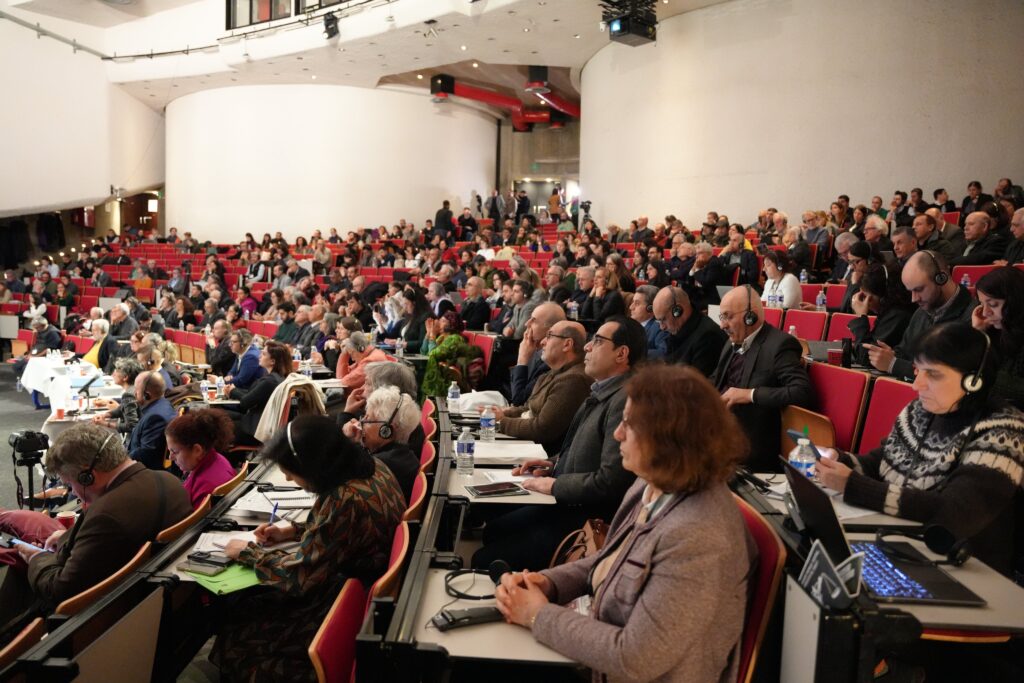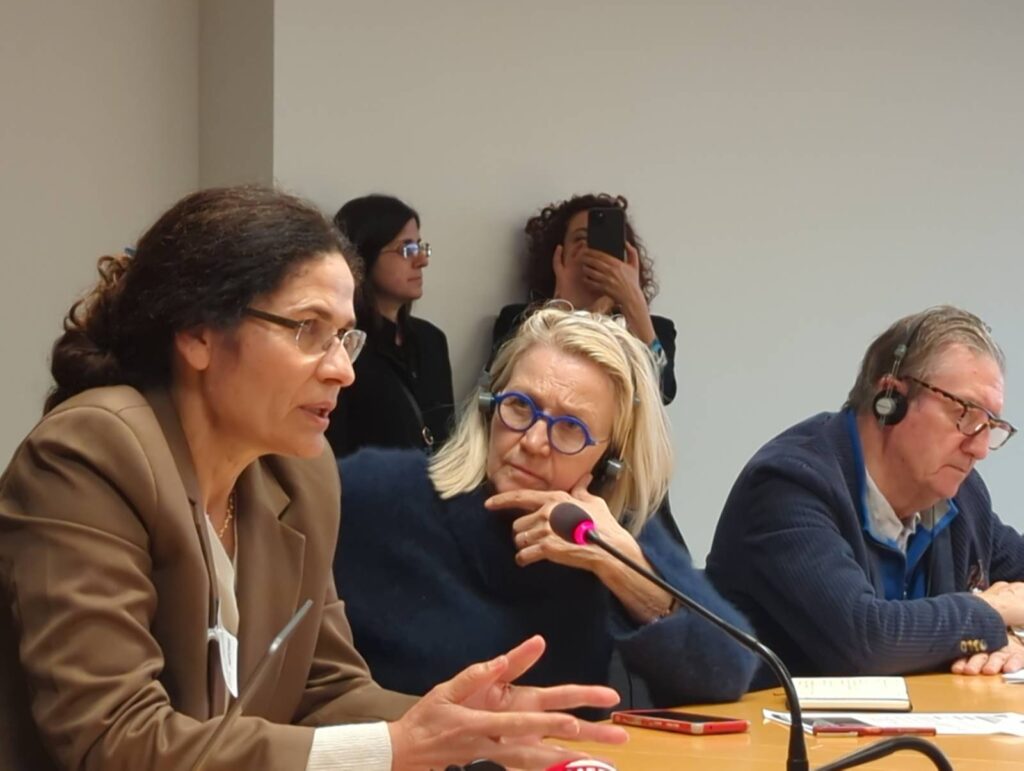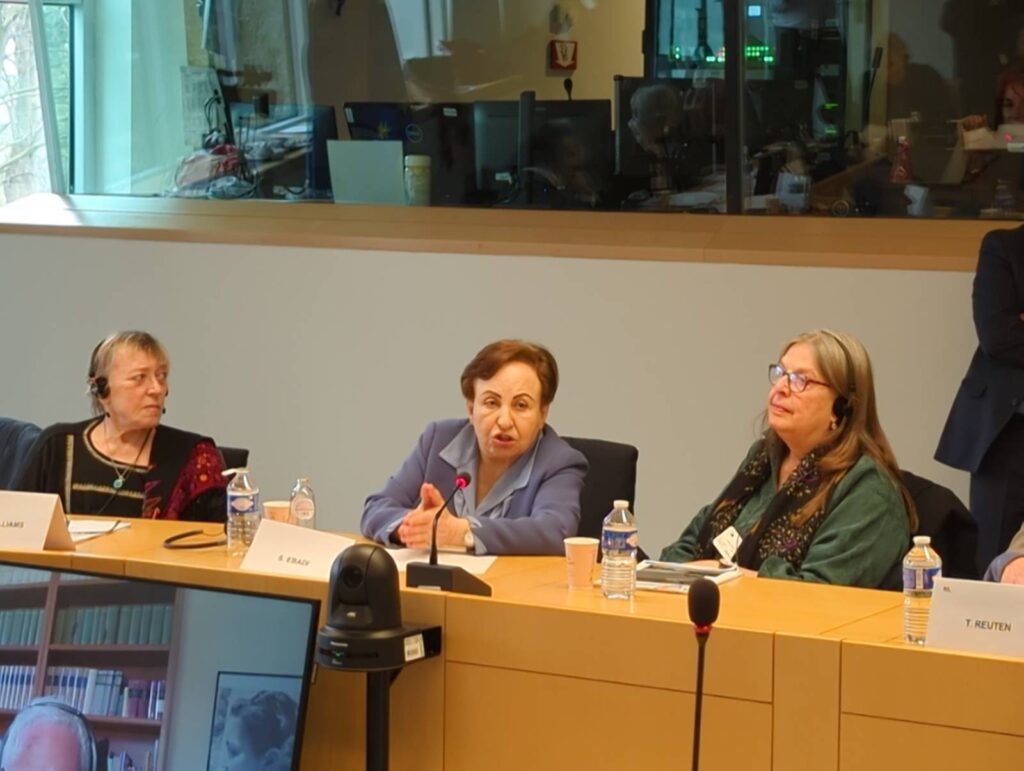The 54th session of the Permanent Peoples’ Tribunal (PPT) met in Brussels, Belgium on the 5-6th of February 2024 to investigate alleged Turkish war crimes in Northeastern Syria. The judges were presented with evidence of forced displacement, mass killings, attacks against civilian populations, gender-based violence, ecological destruction, and other forms of violence by Turkish state and Turkish state-backed forces in Northeastern Syria (Rojava) against civilian populations.
The Permanent Peoples’ Tribunal builds on the tradition of the so-called Russell Tribunals on Vietnam, which document and condemn unpunished crimes. This session of the tribunal was co-organized by the PPT, human rights organizations, the Free University of Brussels (VUB) and the Kurdish diaspora. It was endorsed by over a dozen organizations, including Progressive International, Podemos, the European Left, and the CGT.


Why the tribunal is important?
In the last months, significant steps have been taken towards ending attacks by the Turkish state against Rojava, and a peaceful solution to the Kurdish Question. Since the fall of the Assad Regime, the Democratic Autonomous Administration of Northeast Syria (DAANES) has played an active role in proposing how to develop democratic governance in Syria, in full recognition and respect of the ethnic, religious, and cultural diversity in the country. The fundamental issue of women’s rights and freedom, has been taken up by the Syrian Women’s Council, Kongra-Star and other such initiatives, that stress that women’s freedom and participation in all parts of political and social life must be a defining characteristic of any system of governance to come. A preliminary agreement signed between SDF (Syrian Democratic Forces) General Mazlum Abdi and Interim President Al-Shaara declared a nation-wide ceasefire, the rights of Syrians to participate in political processes regardless of ethnicity or religion, and the rights of those forcibly displaced to return to their homes.
While these recent events mark significant steps forward, there is still a long way to go. The Turkish state has continued with its attacks on Northeast Syria, most recently killing seven people in a drone strike near Kobane. Although positive steps have been made on topics of politics and governance within the region, the question of justice, and accountability for perpetrators remains a central factor—and crucial in fact for the development of democratic politics in the future. For a just, lasting peace is to be found, and democratic governance for all of the peoples of Syria established, accountability and justice for crimes committed against the peoples of the region—which may in fact constitute war crimes and crimes against humanity—marks an important step in healing societal wounds, and in creating a stable foundation on which to build a democracy and a lasting peace.

Final Verdict
In a conference held in the European Parliament on the 26th of March, 2025, the final verdict of the tribunal was presented by the judges, accompanied also by statements from the prosecution team, Members of the European Parliament, and two Nobel Peace Prize Laureates, Jody Williams and Shirin Ebadi.
In the final verdict– which includes, among other things, a detailed analysis of the procedures followed, the facts and the mechanisms that made them possible, the responsibilities of Turkey and the defendants, and the recommendations – the PPT recognizes that the consistent and compelling picture of widespread, pervasive and systematic violations of human rights is equivalent to the punishment of a people for being Kurdish and for creating a society based on the principles of gender equality, inclusion, justice and solidarity. The aim of the punishment is to eradicate Kurdish identity, presence and culture. These systematic human rights violations have their first and original cause in the crime of aggression, committed by Turkey in Syria between 2018 and 2024, and against the will of the Syrian authorities and the Rojava autonomous administration. According to the international law, all military actions of aggression documented, when directed against civilian targets such as hospitals and schools, clearly constitute war crimes.
The judgement also stated that intentionally destroying cultural heritage constitutes the dolus specialis for genocide, while forced displacement of the Kurdish population and ethnic engineering by resettling Syrians from elsewhere constitute crimes against humanity. According to the judgment, “the adjective systematic signifies the organized nature of the acts of violence and the improbability of their random occurrence. Patterns of crimes – that is the non-accidental repetition of similar criminal conduct on a regular basis – are a common expression of such systematic occurrence”. Moreover, in the case of Rojava, violence against women and gender-based intentional killings of prominent Rojava Kurdish women clearly constitute femicide. Based on the evidence presented, recommendations were put forward for the Government of Turkey, Government of Syria, United Nations, the European Council, Council of Europe and Member States, and the international community.
Key recommendations for the Government of Turkey included: to end its occupation of Afrin and the financing of the armed groups operating under its control, and ensure their disbandment, cease all attacks against Rojava and respect the territorial integrity of Syria, and allow independent investigations by the UN and human rights organizations into reported international crimes committed against the people of Rojava, and permit access to detention centers and prisons in the occupied regions.
Recommendations to the Government of Syria included: to acknowledge the right to self-determination exercised through the Democratic Autonomous Administration of North and East Syria, and the autonomy of the administration, respect the arrangements for gender equality and for ethnic and religious equality of representation in the administration of the region, and stop Turkish incursions into Syrian territory, and if they continue, make a complaint to the International Court of Justice, seeking interim measures binding Turkey.
Recommendations to the UN focused on specific actions to be taken by the Security Council, The Independent International Commission of Inquiry on the Syrian Arab Republic, UNHCR, and UN Secretary-General.
The recommendations to the the European Union, Council of Europe and Member States focused on the initiation of procedures against Turkey through the Council of Europe’s Commissioner for Human Rights, the Parliamentary Assembly of the Council of Europe, national courts and prosecutors of the European States, while publicly condemning war crimes committee by Turkey against the peoples of Rojava.
Finally, to the international community, the verdict stresses the importance of ensuring “the conditions for the development of coordinated efforts for the international recognition of the Autonomous Administration in the context of a necessary peace process for the Kurdish people in the region.”

The road ahead
While the judgement of the PPT is not binding, it serves as a reference point for further legal and political advocacy on the topic, and an important mechanism for raising awareness. The final verdict of the tribunal states:
“The purpose of this Tribunal is to counter what Sartre denounced as the ‘crime of silence’, in the face of the atrocities masquerading as anti-terrorist operations which this session has revealed. As the schoolgirl survivors of the atrocity at Schemoka school declared, ‘No one should turn a blind eye to Erdoğan; no one should be silent against the Turkish State’. The Tribunal is a tribune of visibility and the right to speak; the imperative on those who listen is to act, to take the messages conveyed in our recommendations to those with the power to enact them.”
Nobel Peace Laureate Shireen Ebadi further stated:
“How long is this crime going to continue why is no one putting and end to it? Let’s don’t forget that these crimes are not only committed against Kurds in Rojava (Syria) but in Turkey, Iran and Iraq. I hope the world will not turn a blind eye to the situation of the Kurds, human rights activist and journalist be more active!”
It is clear that there are many steps still to be taken, in bringing perpetrators to justice and in building a lasting peace. The concrete recommendations put forward by the Tribunal for international institutions and treaty bodies, as well as to both the Syrian and Turkish government, may serve as guidelines on how to make this happen. However, it is now up to all of us, the international community, international and national institutions, and the peoples of Rojava themselves to make this happen.
In their conclusion, the president of the panel of judges, Frances Webber, and the PPT secretary general, Gianni Tognoni, stressed the absolute priority of this ruling at a time when there is a lack of real paths to justice and spaces for political debate capable of recognising the “Rojava model” as a “window on the future” of peoples’ rights and the credibility of international law.





